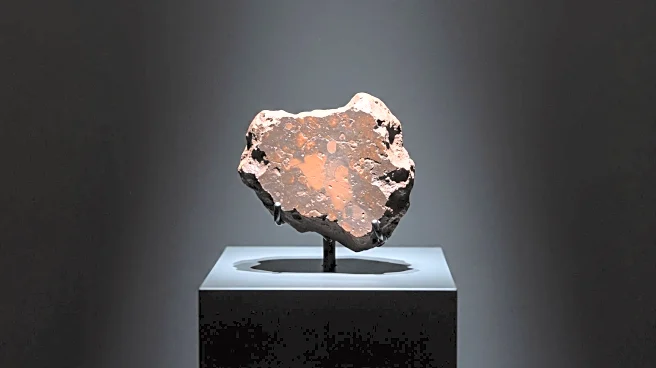What's Happening?
Niger has launched an investigation into the sale of a Martian meteorite, known as NWA 16788, which was auctioned for $5.3 million at Sotheby's in New York. The meteorite, discovered in Niger's Agadez region in November 2023, is the largest piece of Mars found on Earth, weighing 54 pounds. The Nigerien government is questioning the legality of its export, likening the situation to illicit international trafficking. The investigation involves multiple ministries, including mines, security, higher education, and justice, aiming to uncover details about the meteorite's discovery and sale. Sotheby's claims the meteorite was exported in compliance with international procedures, although Niger lacks specific legislation on meteorites.
Why It's Important?
The investigation highlights the complexities surrounding the ownership and trade of space rocks, which are considered valuable for scientific research and cultural significance. The sale of NWA 16788 underscores the growing interest in Martian meteorites among private collectors and investors, potentially impacting scientific access to these cosmic time capsules. The case raises questions about the balance between private ownership and public accessibility for research and education. Niger's inquiry could influence future policies on the export and ownership of meteorites, affecting stakeholders in the scientific community and private sector.
What's Next?
The outcome of Niger's investigation may lead to the establishment of specific legislation regarding meteorite ownership and export in the country. This could set a precedent for other nations with similar discoveries, influencing international policies on space rock trade. Sotheby's is reviewing the information available in light of Niger's concerns, which may affect future auctions and sales of meteorites. The scientific community and policymakers may need to address the balance between private collecting and scientific research accessibility.
Beyond the Headlines
The discourse around NWA 16788 sheds light on the murky legal and ethical issues of space rock ownership. As meteorites hold significant scientific and cultural value, the case may prompt discussions on the ethical implications of private ownership versus public access. The investigation could lead to long-term shifts in how meteorites are perceived and regulated globally, impacting scientific research and cultural heritage preservation.









